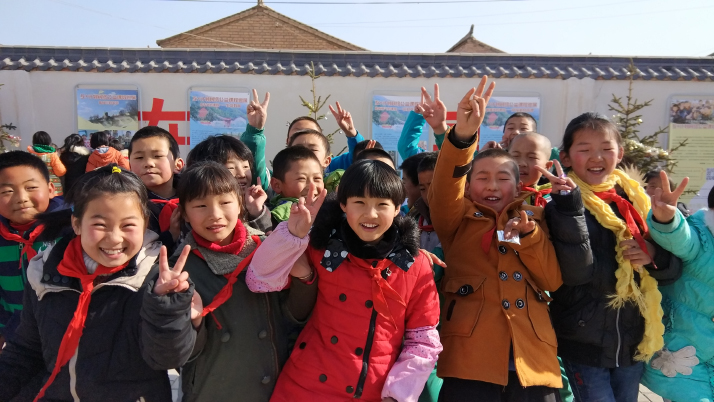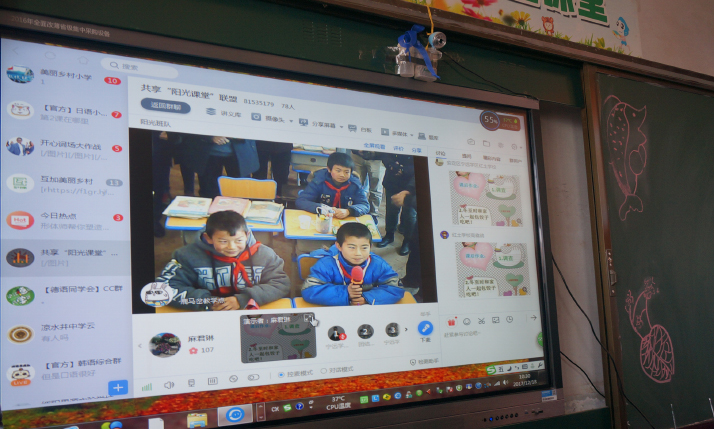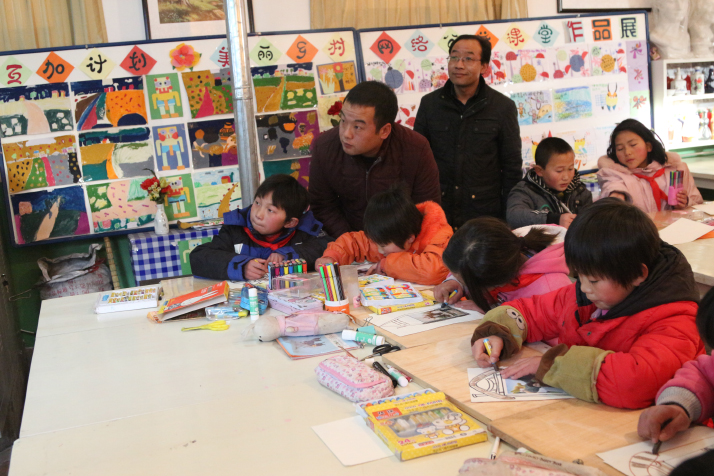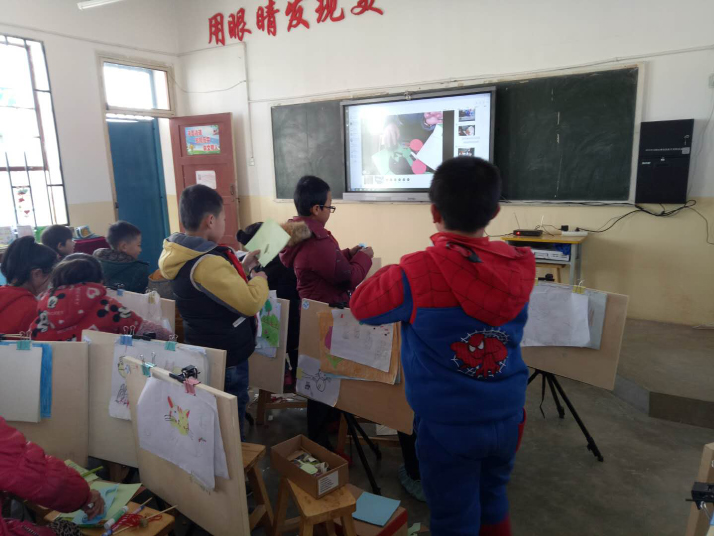|
||||||||||
| Home Nation World Business Opinion Lifestyle ChinAfrica Multimedia Columnists Documents Special Reports |
|
||||||||||
| Home Nation World Business Opinion Lifestyle ChinAfrica Multimedia Columnists Documents Special Reports |
| China |
| A Ray of Sunshine |
| In west China, small rural schools and an online educational company are joining efforts to provide better education for students through the Sunshine Classes initiative |
| By Ge Lijun | VOL.10 February 2018 ·2018-02-26 |

But little Chang likes to look on the bright side: In May 2017, he said, the old blackboard in his classroom was replaced by a brand-new electronic board. On the screen, a teacher from another school is giving a painting class to his and his two classmates in real time. Thanks to the CCtalk software, developed by online educational company Hujiang, the three students can now enjoy art classes for the first time.
Indeed, the subjects taught in many rural primary schools in Dingxi are restricted to Chinese language, mathematics and English. "Art classes are also very important for our students. The problem is that there is a serious shortage of teachers for these subjects. That is why we started using online education," explained Shao Jintang, head of Lijiabao School District, under which Lumacha Primary School falls.
An example to follow

Gansu Province has more than 8,000 schools with fewer than 100 students and more than 800 schools with fewer than 10 students, mostly scattered in the province's mountainous counties. Teachers often have to cover long distances on foot to teach in different schools. Volunteer teaching assistants can only provide a temporary solution.
Since 2012, a series of policies on education computerization have been adopted by the Central Government, bringing Internet network facilities to rural areas. Today, the Internet penetration rate in Gansu Province has reached 90 percent. Building on this momentum, Hujiang started a project in 2015 aimed at solving educational problems in remote areas with the help of the Internet.

It is in this context that Shao and about 20 other teachers launched the Sunshine Classes initiative, through which a number of classes can be given and taken online. In September 2017, three other school districts in Dingxi adopted the concept as part of their curriculum. One semester later, this positive change has made students more open and confident, according to Shao.
Wang Yali, who graduated from a primary school in Lijiabao School District in June 2017, used to be quite lonely in school. And for a reason: at the time of her graduation, she was the sole student in her class. But thanks to Sunshine Classes, she finally had classmates with whom to study. A graduation ceremony was even held online, and attended by students from all schools in the Lijiabao School District. Teachers have also made some progress, despite the extra work required to prepare online classes. "I have more work to do, and I do not earn much more than before, but I prefer the Sunshine Classes. When I turn on the computer, it is like opening a window to the outside world for my students," said Liu Taolin, an assistant teacher in Lijiabao School District.
From a material point of view, schools were fully equipped as early as 2012. But the lack of resources made it impossible to use the electronic boards. The Sunshine Classes initiative gave momentum to the computerization of rural schools.
Rural education still an issue
In 2017, the Chinese Government invested more than 270 billion yuan ($42 billion) in education computerization. In 2018, the figure will rise to 310 billion yuan ($48 billion). An electronic whiteboard costs on average 10,000 yuan ($1,500). The problem is that many rural schools are unable to use them.

"We lack specialized teachers in art, hazard prevention and even psychology," said Shao. According to him, the West China Development program implemented since 2000 has made great strides in reducing poverty, especially in Gansu
Province in recent years. However, in some villages, communities remain stuck in poverty. "Students from these families need more attention," he added.
"We need to combine different resources and fully leverage them to create a more just educational environment," said Wu Hong, Education Manager at Hujiang. "I happened to visit a classroom in rural areas where I saw a high-end electronic board, which costs about 40,000 yuan ($6,000), but students' desks were quite old and broken."
According to her, money should be spent more wisely. "In the past, supporting education in impoverished areas only meant increasing the number of teachers, building more schools and sending more volunteers. But now, we need to be innovative in helping these schools so as to provide more sustainable support to them," she said. "We can achieve this through the Internet, and this model can be reproduced everywhere." For the moment, Sunshine Classes are still struggling with a number of difficulties, like already outdated electronic boards and slow Internet access. "I believe these difficulties will be soon solved. I will continue to promote our concept in 2018. We started implementing it just six months ago, but the results speak for themselves," concluded Shao.
| About Us | Contact Us | Advertise with Us | Subscribe |
| Copyright Beijing Review All rights reserved 京ICP备08005356号-5 京公网安备110102005860号 |